The Gift of South Dakota
Subscriptions to South Dakota Magazine make great gifts!
Subscribe today — 1 year (6 issues) is just $29!
Leaving Tracks
Editor’s Note: Phillip Hammes is a Vietnam veteran and a former city councilman in Cannon Falls, Minn. His story is revised from the September/October 2000 issue of South Dakota Magazine. To order a copy or to subscribe, call 800-456-5117.
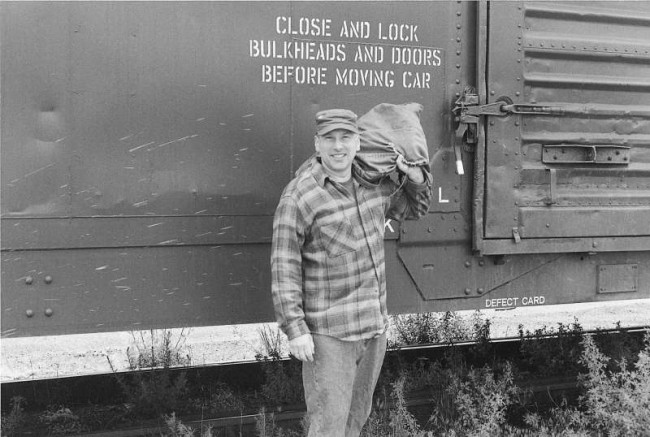 |
Some people eat too much when they’re nervous. I get restless and travel to far places. I once boarded a freight train in Portland, Ore. on a journey to Sioux Falls, returning to the Midwest I’d left in the spring. I like to recall this rocking ride across the plains. “Memories,” said legendary middleweight champion Mickey Walker, “are a second life.”
I hopped the train on a cool morning in 1982 as more sober citizens hustled to work. I jumped on a flatcar and rolled into a white wall of pine boards, a sack of potatoes with initiative. The train rolled out and began to gather speed. I crouched behind my duffel bag to break the wind and watched the mellow woods flow by.
Trains are a civilized method of travel. If a person takes a car he must drive the machine; if he takes a plane he has the feeling that science and magic have conspired to charge the melodramatic side of imagination. But a train is mechanically logical. It requires nothing of the passenger but patience.
I got off the train in Whitefish, Mont. The morning sun and I arrived in town at the same time, but the sun got the warmer greeting. At a gas station I commandeered the restroom for some time; I shaved and gave myself a quick sponge bath. A person has not lived until he has stood half naked in a drafty cubicle, blotting himself dry with 14 tiny paper towels while an irate mob tries to break down the door.
From the gas station I went to the highway. I intended to hitch a ride to Rapid City and catch a train from there to Sioux Falls. Two rides, one from a truck driver who did a great imitation of Hank Snow, brought me to southeastern Montana. Then I got lucky.
An elderly couple in a green 1959 Chevrolet stopped and offered me a ride. They had been visiting a relative in Helena and were on their way home to Farmingdale, S.D. We moved off at the breath-taking rate of 45 mph. All the way to the Black Hills, the one car we passed was setting beside the road with a flat tire.
“Where are you going?” asked the man at the wheel.
“Rapid City,” I replied.
“Live there?”
“No. I want to catch a train to Sioux Falls.”
“Is that your home?”
“No. I know a young lady there.”
The woman cleared her throat. The man nodded.
“Where are you from?” asked the woman.
“St. Paul. I worked in Portland this summer. Now I’m going back.”
The man nodded again. “I see. What do you do?”
“Anything,” I said cheerfully.
The woman smiled and looked through the window. The man gave me a look in the mirror. Then he quoted Job. “It says in the Book, ‘the range of the mountains is his pasture, and he searcheth after every green thing.’ That about it, son?”
“Yes,” I told him, still cheerful.
The man looked satisfied. He had made his point. Being a guest, I didn’t tell him that my thoughts also ran to Job: “How long wilt thou speak these things? And how long shall the words of thy mouth be like a strong wind?”
We drove through Spearfish, Piedmont and Black Hawk. The man took a detour to let me see the white boulders north of Piedmont. They were a startling sight; it looked as if a covey of feathered dinosaurs had dropped eggs on the pastures.
They let me off on the outskirts of Rapid City. The woman pressed a dollar bill into my hand. “Good luck,” they said, almost in unison.
Mount Rushmore was nearby. I got a ride to the monument. It was an impressive sight. The four ex-presidents gazed down from their mountain like Biblical judges deciding the fate of the land. There was not a hint of humor or irony in their eyes; they must have been great poker players.
Just down the road an entire mountain was being chipped away in five-ton increments to make a statue of legendary Sioux chief Crazy Horse. The region must have either a reverence for great men or a manic desire to make the plains the largest open-air museum in the world. Some old-timers believe this rock carving originates in the habit of whittling. I do not ascribe to the theory. That is like saying Americans laid the Atlantic cable because New Englanders had the habit of saving string.
I wandered through downtown Rapid City until I found a bookstore. In a bin of old paperbacks in the corner I found a slim book on the city, paid my quarter and put it in my back pocket. The first chapter had a biography of a woman named Dora Dufran. She lived in South Dakota during the late twenties and died in Rapid City in 1934. The woman had owned and operated houses of ill repute, and at the same time, made a name for herself as a humanitarian, doing charity work for many causes. An anecdote in her history amused me.
One night a flood took out a bridge over the creek in front of Dora Dufran’s establishment. The men who had been enjoying her hospitality discovered that they could not return to their homes on the other side of town. In the morning the water receded and a line of men began to ford the creek. Waiting for them on the far shore, in military formation, was a squad of unhappy wives. Unfortunately, there were no television cameras to record the event.
And then there was “Hooky Jack” Leary. He was a hard rock miner who had lost his hands in a mine accident. The city appointed him night policeman. He did well even though he had hooks instead of fists to enforce the law. One night, after a football game, a group of rowdy teenagers hanged Mr. Leary from a tree limb by his hooks.
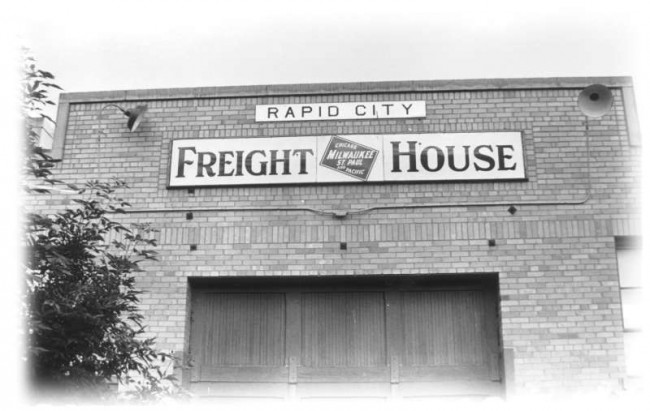 |
Later that night, cowboys from a nearby ranch came into town. They rounded up the ringleaders of the gang, marched them to the Harney Hotel, and before an appreciative audience, spanked their nude bottoms.
I went to the railyards, which I found as confusing as a Star Trek script. After a freight ride and a long bout of hitch-hiking, I did not resemble a Cornell undergraduate at a soccer game. My hair was matted and my clothes gave off a peculiar fragrance. I had the slightly wild-eyed look of a man with habitual insomnia. Usually yardmen did not mind a man grabbing a ride. They tried to ignore transients so long as they didn’t create a problem. I ranged a mile down the tracks looking for someone who would talk to me.
Finally an older man in black overalls stopped. He looked tired himself, with a day’s growth of white whiskers on his chin. He stared at me for a few moments before speaking.
“Where are you heading?” he asked, wiping his hands on a rag.
“Sioux Falls,” I told him. “There’s a job waiting for me there. But I’m broke.”
He nodded. “I’ve been there,” he said. He told me which train I needed and what track it was on. Then he handed me a candy bar.
“Stay low and don’t get noticed,” he advised. “No fires for cooking or heat.”
“I wouldn’t do that.”
I walked along until I found an empty boxcar. There was a white powder on the walls but the interior looked fairly clean. I climbed in and sat down. There was a length of wood in the corner, and before the train moved I shoved it in the doorway. I did not want the doors to slide shut and trap me inside.
The train snorted and pulled out in late afternoon. On the edge of the city it crawled through a crossing. Vehicles were lined up behind a black and white barrier. A child standing in the back of a battered pick-up, his arms on top of the cab, waved to me. I waved back. His father gave me a look of pure disdain.
As the train picked up speed a young Native American man sprinted to the door and dove through. I pulled him inside. He wore a blanket roll on his back. His thick, black hair was tied in a long ponytail. He slid to the wall and caught his breath. We stared at one another without speaking.
“What do you say?” he asked at last.
“Do you have a ticket?” I wondered.
He hesitated a moment before smiling. “No,” he said. “I didn’t think I needed one back here.”
“Where are you going?” I asked.
“I’m just going.” He took off the blanket roll and stretched his legs. “My name is John.”
I told him my name and said I was glad to have company. “I’m going to Sioux Falls.” I went to the door and let the wind hit me in the face.
John opened his blanket roll and removed a bag. “Are you hungry?” he asked.
At that moment I could have gnawed my way through a bowl of wax fruit, a paper-mache turkey and a plate of candied birch bark.
“I could eat,” I admitted casually. From the bag he took cans of tuna fish, beans and roast beef hash. He had several chunks of what he called buffalo jerky. Inside a rolled shirt he had a small canteen filled with spring water.
He couldn’t find his opener so I offered my P-38. It was on my Hopalong Cassidy key chain, a small metal claw able to open any can. That item, and a habit of never wearing the same boots two days in a row, were all that I had retained from my days of military service.
I had a tin can I used for drinking. John emptied a portion of food from each container into my cup. He had several plastic spoons. We ate squatting on the boxcar floor, saying nothing as the train rocked and rolled through the gathering twilight.
For dessert I pulled out the chocolate bar the yardman had given me and broke it in half. My companion took his share and handed me a piece of jerky.
“Save it for later,” he advised.
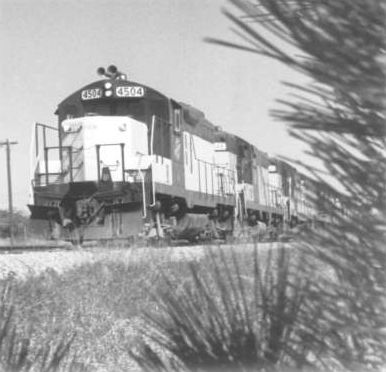 |
Some people believe in worlds within worlds. Gazing across the unending plains beyond the boxcar doors I could not believe anything could contain the landscape I was passing through. I was wrong. My mind held the hills and the buffalo grass quite easily. The lure of the open spaces is the lure of freedom. Mind and body seem capable of anything. I felt the attraction of the high plains.
The atmosphere did not seem to fascinate or disturb my companion. I studied him. He had a long slim nose and a thin line scar along his jaw. His large black eyes were clear and steady.
“Where are you from?” I questioned him.
“The Fort Belknap Reservation,” he said. Under a blue denim jacket he wore a black and red New York Rangers sweatshirt.
“I’ll trade sweatshirts,” I offered. Mine said Miami Dolphins.
“No,” he laughed. “Mine is warmer.
A little while later I asked him why he decided to travel.
“There was something that happened. People wanted me to tell them about it. I didn’t want to.”
“I see.”
“So I’m going to see a cousin in Red Wing, Minnesota.”
“Do you like this cousin?”
“I like all my cousins. Do you like all your cousins?” he asked.
“I have no cousins,” I told him.
“None?”
“None. They resigned as cousins and said they just wanted to be friends. I was visiting them too often.”
He nodded. “Do you want to borrow a cousin?”
“No. I’ve seen Red Wing.”
He laughed. “Maybe I’ll borrow one of your friends. I have cousins but not enough friends.”
The train pushed through the tomb-like darkness, making a tunnel with its noise and speed. It swayed and sagged in arthritic accompaniment to the terrain.
I sprawled on the hard wood floor, my duffel bag beneath my head. Somewhere people were stuffed into bus seats and sardined into the narrow aisles of airplanes. Modern travel, the formal expensive kind, was beginning to resemble the definition of intimacy once offered by Lord Chesterfield: “The pleasure is momentary, the position ridiculous and the expense damnable.” I was traveling in relative comfort and paying what Ebenezer Scrooge used to leave as a tip at his favorite pub.
The train halted on a side-track. It sat for at least 20 minutes; it was as if all living things, except the crickets, had deserted the land.
“Quiet,” I remarked.
John nodded. “I can hear the owls breathing in Canada.”
The silence was magnificent. The empty landscape crept into the boxcar and soon was as familiar as the darkness. The vast quiet held fascination, as if it were an invisible ocean. The great waters enthrall with their ceaseless movement. Silence mesmerizes with visions of endless horizon lines, a perfect atmosphere for thought.
Suddenly wind charged like the cavalry. Another freight shrieked past with the surprise of a minor Armageddon and then was gone.
At last our train jolted into movement and soon a little town appeared, as if in a dream. There was a grain elevator and a home and a few stores leading to a dried-up main street and a few more darkened homes — a landscape made of mystery and sweat — and then the grass began again.
Bread and water may keep a man alive as long as pheasant and wine, I thought. Choice becomes taste and taste appetite until the bones of creation are hidden by the flesh of desire. Desire was modest on the plains, from necessity and choice.
We rumbled through many darkened towns, but I did not know their histories or their names. Then the sun came up again and then we rolled into Mitchell.
I persuaded John to get off the train with me. I had seen Mount Rushmore, so I wanted to see the other great attraction, the Corn Palace. He agreed, reluctantly. He had no real affection for corn or for architecture.
As a fifth grader in Garfield School I wrote an essay on the Corn Palace. All I recalled was that John Philip Sousa had come to play in the Palace, but without great enthusiasm. The city had to pay his fee before he would get off the train. But the March King had such a good time in Mitchell he gladly returned in other years.
The Corn Palace was unique but not strange. Inspired not by logic but by fancy, it is large and garish, its bulbous towers and crayon-shaded walls coated with elements not usually associated with the construction trade. Its murals were prairie scenes made of multi-colored corn, millet, Sudan grass and oats. For all its rakish qualities it seemed to fit where it was built.
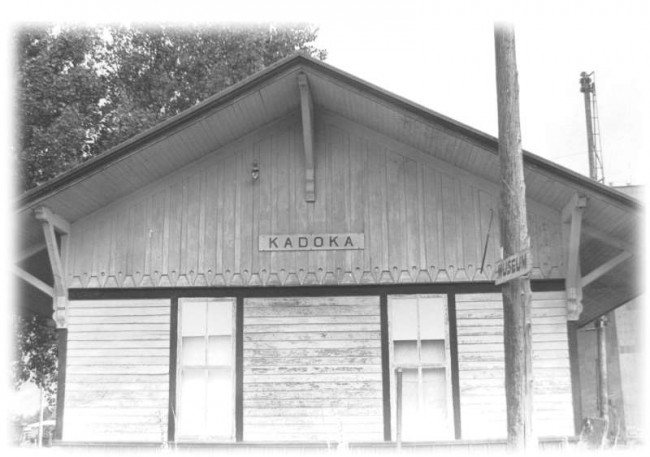 |
I liked the Corn Palace. It reminded me of the early 20th century cartoon strip “Little Nemo in Slumberland” by artist Winsor McCay. Like Nemo’s magic land, in which a snowman might grow into a giant with crystal eyes and a vanilla ice-cream beard, the Corn Palace might have been dreamt up by a youngster from Kadoka or Murdo after one too many double chocolate ice cream sodas.
We bought a day-old loaf of wheat bread, two cans of tuna fish and a package of Twinkies, and caught another freight heading east for the last stretch to Sioux Falls. Now the landscape was more like what I knew in Minnesota, the rise and fall of pasture and hills. Fall winds had roughened the vegetation to the colors of wet metal, dull lime and bronze. Stacks of hay Monet might have painted dotted harvested fields.
We agreed to jump off the train before it rolled into the Sioux Falls yards, out of sight of laborers and railroad security. There is a thought process which takes place before one leaps from a moving train, the same that happens before a man tackles an opponent head-on in a football game, or sits down to eat chili in a strange café. The mind must accept what is about to happen, concede it might end badly, and dismiss it from rational thought. The truth is, if one is about to do a risky thing his imagination has been previewing it for some time.
I crouched and watched the ground pass by in a blur. I threw my duffel out and watched as it hit the ground and rolled. I inhaled, exhaled and jumped. For a moment I was detained in limbo. Then my shoulder, my side and my leg struck the earth. As I tumbled my senses returned, on after another, like notes in a well-played chord.
John came after me. He bounced one more time than I had. But he was laughing as he rose to his feet. We collected our bags and limped into the city together.
We parted in Sherman Park. John was anxious to roll on to Minnesota. I wanted see a young lady, to explore Sioux Falls, and I had no schedule to keep. I gave John my red-handled pocketknife, which he had admired, and he presented me with a turquoise and bronze figure of an eagle that fit nicely on my key chain. We shook hands, and his blue denim jacket disappeared behind a tall oak.
Thinking of the trips I made by rail, I see that they were more than idle excursions. People go to universities to learn law and medicine. Others work in factories and never stray from familiar neighborhoods. Whether a person stays or goes, he is on a journey. The desire to see and experience prompted me to dash across the middle of the continent. Only time can determine how successful these flights happened to be.
The night I lay in a boxcar somewhere west of Mitchell, feeling the wind and smelling the sage, watching the stars immobilize time beyond the blue-black clouds, a truth came to me in the clarity which sometimes accompanies unforced thought: we interpret our personal journeys by the actions we take.
A writer is perhaps more literal than others in his choice of vocation. He does what talent and instinct urge him to do and waits for vindication, which seldom comes. But as the wind and the sage and the stars struck time from reality, I saw that I would one day translate the experience, like a physics student with a set of equations. The main satisfaction a writer receives is the only satisfaction a traveler accepts, safe arrival at an imagined destination, and faith the journey has been worth the effort.


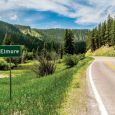

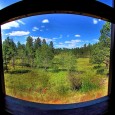
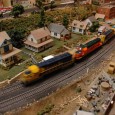
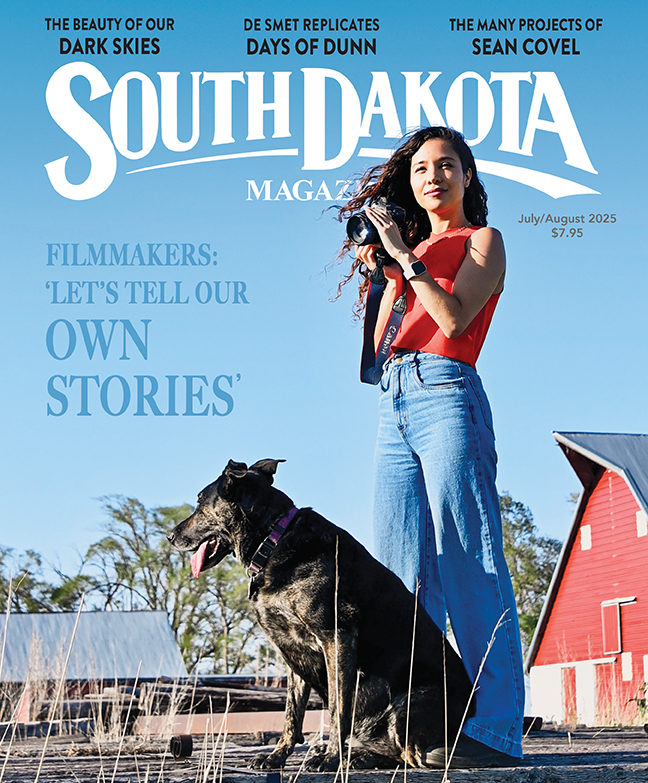

Comments